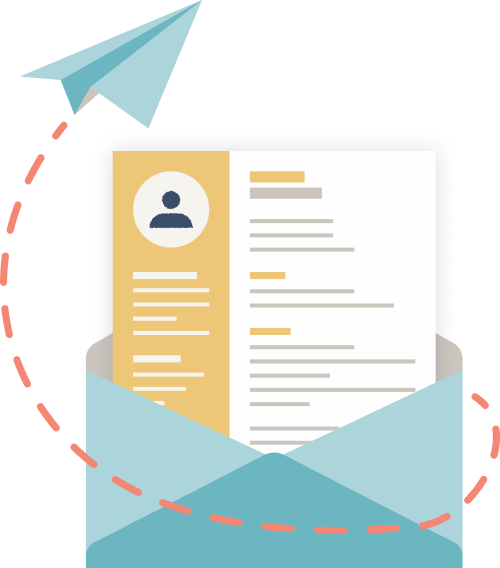How to Include Salary Requirements in a Cover Letter
Writing a cover letter is already a key part of the job search, but adding salary expectations can make things more complicated. You might worry about saying too much, too soon—but when handled well, mentioning your salary requirement can show that you understand your market value and respect the employer’s time. In this guide, you’ll learn when it’s appropriate to include salary requirements, how to phrase them professionally, and what mistakes to avoid.


Our customers have been hired by: *Foot Note
Should you mention salary expectations in a cover letter?
Including salary requirements in a cover letter depends on the job ad and the hiring process. If a company specifically asks for it, you should always provide a response. However, if the job advert doesn’t ask for salary expectations, it’s often better to wait until the interview stage, when you’ve had a chance to show your value and learn more about the role.
When to include salary expectations:
- The job description clearly requests them.
- The employer inquired about this during the early application stage.
- The application form includes a salary field.
- The role is commission-based or target-driven, where compensation is part of the total salary.
Pros:
Shows that you follow instructions.
Saves time by aligning expectations early.
Can filter out low-paying jobs
Demonstrates professionalism and awareness of market value.
Cons:
It may disqualify you if your range is too high.
It can limit room for negotiation.
Might shift focus away from your skills and experience.
Where to include salary requirements in a cover letter
Include your salary expectations towards the end of your cover letter, ideally just before the closing paragraph. This placement allows you to first highlight your interest in the role and demonstrate your qualifications.
Starting your cover letter with salary requirements can seem like you’re more focused on pay than the position itself, which may put off potential employers. By first showing why you’re a good fit, you create a more positive impression and make your salary expectations feel like a natural part of the conversation, following the typical approach to writing a cover letter.

In summary
- Avoid mentioning it at the very start of the letter.
- First, highlight your interest in the job and your qualifications.
- Add the salary expectation before the closing paragraph.
Tips for wording it well:
- Be polite and open to discussion.
- Use a salary range to allow for flexibility.
- Keep it brief, just one or two sentences.
Example phrases
- “Based on my experience and the role’s responsibilities, I would expect a salary in the range of…”
- “While my expected salary is £X, I’m open to discussion depending on the overall compensation package.”
Example salary statements for cover letters
To make your salary expectations sound professional, clear, and approachable, use short statements tailored to the job type and application context. Below are examples of how to phrase your expectations, depending on the situation.
Simple range example:
- “I would be comfortable with a salary in the range of £30,000 to £35,000, depending on the overall compensation package.”
- “I’m seeking a salary in the region of £28,000 to £32,000, in line with similar roles in this field.”
Specific figure (if required):
- “My expected salary for this role is £42,000, based on my skills and current market rates.”
- “I would be looking for a salary of ideally £38,500, reflecting my experience and qualifications.”
Flexible or open-ended example:
- “While I do have a salary range in mind, I’m open to discussing compensation during the interview process.”
- “My salary expectations are negotiable depending on the scope of responsibilities and benefits.”
Full cover letter example with salary expectation
Here’s a practical example of how to include salary expectations within a full cover letter example. The salary requirement appears after the key achievements and before the closing paragraph.
Dear Hiring Manager,
I’m writing to express my interest in the Marketing Coordinator role at Dibe Media. With over three years of experience in digital marketing and a strong background in campaign management, I’m confident in my ability to make an immediate contribution to your team.
In my previous role at Webtonic, I increased social media engagement by an average of 27% and led a product launch campaign that generated £135,000 in revenue within four months. I’m passionate about driving results through creative content and strategic planning.
Based on my experience and the role’s responsibilities, I am looking for a salary in the range of £32,000 to £36,000. I am, however, open to discussion depending on the overall compensation package.
Thank you for considering my application. I would welcome the opportunity to further discuss how I can support your goals at Dibe Media.
Yours sincerely,
[Your Name]
What to avoid when mentioning salary expectations

While it’s important to be clear about your expectations, certain missteps can give the wrong impression. You want to come across as informed and flexible, not rigid or unrealistic. If the employer has already stated a salary range in the job advert, there’s no need to repeat it; simply acknowledge that the listed range is acceptable, or skip the mention entirely.
It’s also worth considering your level of experience. If you’re applying for your first job, an internship, or an entry-level role, being too specific about salary can seem out of place. Hiring managers are more likely to expect salary discussions from experienced professionals, who typically have more negotiating power and clearer benchmarks for their market value.
Avoid:
- Being overly firm or demanding in your wording.
- Providing unrealistic expectations—choose a range that reflects your current market and level.
- Repeating figures already listed in the job description.
- Including salary demands too early in the letter. It can shift the focus away from your skills and motivation.
Final tips for salary expectations in cover letters
In general, if the job advert specifically asks for salary requirements, you should include them in your cover letter. However, if there’s no mention of salary, it’s often better to wait until the interview stage, when you’ll have a better understanding of the role and how your experience fits.
If you do mention salary in your cover letter, aim for a range rather than a fixed number. This shows that you’re flexible and open to discussion, which employers tend to appreciate more than a rigid figure.
Lastly, use tools like Glassdoor, Indeed, and Salary Expert to help you research typical pay for the role and location, ensuring your range is realistic and competitive.
Additional advice:
- Research salary trends: Use reliable sources to find out what similar roles pay in your location and industry.
- Consider delaying the conversation: If not required in the application, you can wait until the interview stage.
- Use a cover letter template: Using a template ensures your letter is correctly formatted and well organised, which can improve your chances of making a strong, professional impression.
- Boost your value with a strong CV: A clear and well-structured CV makes it easier to justify your salary expectations.
- Stay confident: You bring value to the company—make sure your wording reflects that without sounding rigid.
Key Takeaways
- Only include salary expectations in a cover letter if requested by the employer.
- Place the salary expectation before the closing paragraph, after highlighting your skills.
- Be polite, flexible, and use a range rather than a fixed number.
- Avoid being overly firm, repeating job ad details, or quoting unrealistic figures.
- Back up your salary range with market research and a strong CV to match.
- Consider using a cover letter builder to create a strong application letter that improves your chances of securing an interview.

Andrew Smith
Senior Content Writer
Meet Andrew Smith – an accomplished English copywriter with a strong background in SEO optimisation. Passionate about producing engaging content, Andrew has written across various fields, including health and fitness, security, travel, and tourism.
*The names and logos of the companies referred to above are all trademarks of their respective holders. Unless specifically stated otherwise, such references are not intended to imply any affiliation or association with myperfectCV.










